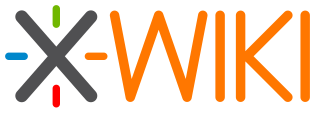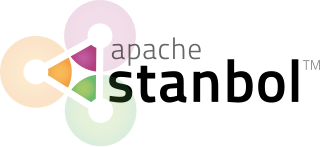
Drupal is a free and open-source web content management system (CMS) written in PHP and distributed under the GNU General Public License. Drupal provides an open-source back-end framework for at least 14% of the top 10,000 websites worldwide – ranging from personal blogs to corporate, political, and government sites. Systems also use Drupal for knowledge management and for business collaboration.
The following tables compare general and technical information for a number of wiki software packages.
A web content management system is a software content management system (CMS) specifically for web content. It provides website authoring, collaboration, and administration tools that help users with little knowledge of web programming languages or markup languages create and manage website content. A WCMS provides the foundation for collaboration, providing users the ability to manage documents and output for multiple author editing and participation. Most systems use a content repository or a database to store page content, metadata, and other information assets the system needs.

XWiki is a free wiki software platform written in Java with a design emphasis on extensibility. XWiki is an enterprise wiki. It includes WYSIWYG editing, OpenDocument based document import/export, semantic annotations and tagging, and advanced permissions management.

Markdown is a lightweight markup language for creating formatted text using a plain-text editor. John Gruber and Aaron Swartz created Markdown in 2004 as a markup language that is appealing to human readers in its source code form. Markdown is widely used in blogging, instant messaging, online forums, collaborative software, documentation pages, and readme files.

FOAF is a machine-readable ontology describing persons, their activities and their relations to other people and objects. Anyone can use FOAF to describe themselves. FOAF allows groups of people to describe social networks without the need for a centralised database.

CKEditor is a WYSIWYG rich text editor which enables writing content directly inside of web pages or online applications. Its core code is written in JavaScript and it is developed by CKSource. CKEditor is available under open source and commercial licenses.

An online rich-text editor is the interface for editing rich text within web browsers, which presents the user with a "what-you-see-is-what-you-get" (WYSIWYG) editing area. The aim is to reduce the effort for users trying to express their formatting directly as valid HTML markup.
WYMeditor is an open-source WYSIWYM text editor written in the JavaScript programming language for editing content on web pages. It is based on the jQuery JavaScript framework. It differs from other embeddable text editors such as FCKeditor and TinyMCE in that it concentrates on the semantics and meaning of content leaving out visual details. Unlike WYSIWYG editors, it explicitly shows the XHTML structure of content to the user.

Big Medium was a browser-based web content management system (CMS) written in the Perl programming language and developed by Global Moxie, the Paris-based company of independent developer Josh Clark.

TCPDF is a free and open source software PHP class for generating PDF documents. TCPDF is the only PHP-based library that includes complete support for UTF-8 Unicode and right-to-left languages, including the bidirectional algorithm.
ShiVa3D is a 3D game engine with a graphical editor designed to create applications and video games for desktop PCs, the web, game consoles and mobile devices. Games made with ShiVa can be exported to over 20 target platforms, with new export targets being added regularly.

TYPO3 is a free and open-source Web content management system written in PHP. It is released under the GNU General Public License. It can run on several web servers, such as Apache, Nginx or IIS, on top of many operating systems, among them Linux, Microsoft Windows, FreeBSD, macOS and OS/2.

PhpStorm is a proprietary, cross-platform IDE for PHP, built by the Czech Republic-based company JetBrains.

Google Plugin for Eclipse (GPE) was a set of development tools that enabled Java developers to design, build, optimize, and deploy cloud computing applications. developers in creating complex user interfaces, generating Ajax code using the GWT Web Toolkit, and deploying applications to Google App Engine. GPE installed into the Eclipse integrated development environment (IDE) using the extensible plugin system. GPE was available under the Eclipse Public License 1.0.
Taiwan Fellowship Editor is an open-source WYSIWYG and free editor based on CMS of Project Gutenberg to be used for editing and formatting online paperback and e-books. Taiwan Fellowship is regarded as an efficient online tool for authorized editors and accredited publishers to use in their work-flow while working on both Paperback books and e-Books structured in Amazon's Cloud Computing Center. It is developed by EHanism Global Corporation, an IT Service company in June 2012.

Apache Stanbol is an open source modular software stack and reusable set of components for semantic content management. Apache Stanbol components are meant to be accessed over RESTful interfaces to provide semantic services for content management. Thus, one application is to extend traditional content management systems with semantic services.

H5P is a free and open-source content collaboration framework based on JavaScript. H5P is an abbreviation for HTML5 Package, and aims to make it easy for everyone to create, share and reuse interactive HTML5 content. Interactive videos, interactive presentations, quizzes, interactive timelines and more have been developed and shared using H5P on H5P.org. H5P is being used by 17 000+ websites. In June 2018 the core team announced that H5P will be supported financially by the Mozilla Foundation within the MOSS program.
ContentTools is an open-source WYSIWYG editor for HTML content written in JavaScript/CoffeeScript by Anthony Blackshaw of Getme Limited.












